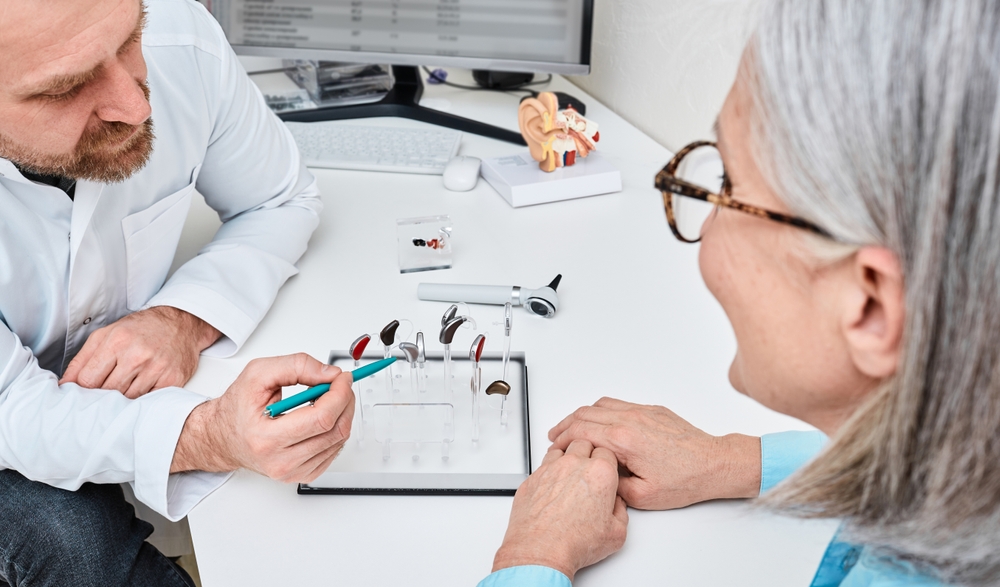 Your body gets wear and tear as you age, which can trigger changes. These changes can come in many forms, like sore joints, lower energy levels, back pain, and cognitive decline. However, hearing loss is another common symptom that many experience in their later years.
Your body gets wear and tear as you age, which can trigger changes. These changes can come in many forms, like sore joints, lower energy levels, back pain, and cognitive decline. However, hearing loss is another common symptom that many experience in their later years.
However, not everyone will experience hearing loss as they age, at least not to a noticeable extent. Some people can retain excellent hearing throughout their lives by practicing good hearing health practices like avoiding loud music and ear infections, and due to genetic components preventing hearing deterioration.
This article will explore the links between aging and hearing loss so you can know the facts about hearing loss and what you can expect as you enter your golden years.
Changes in Hearing Due to Age
See below for an outline of hearing capabilities through different life stages and the significance of the changes to hearing in different life stages.
Childhood
During childhood, your hearing is more sensitive and acute than in the later stages of life. Children can hear higher frequencies than adults, and they can generally hear quieter sounds than adults, too. Since children have more sensitive hearing, this can make proud noises, especially harmful or distressing for some kids.
Children have better hearing as they have not been damaged by loud noise or deteriorated like in older adults.
Early Adulthood
During early adulthood, many people will retain excellent hearing. However, some high-frequency noises are typically beyond the ears of people over 18. While many young adults have excellent hearing, the CDC claims that as much as 13% of adults in this age group will experience some hearing loss.
Socializing as a young adult by attending concerts, movies, nightclubs, and other loud environments can accelerate the rate of wear on hearing during this stage in life.
Mid-Life
When you hit your mid-life, the chance of you experiencing hearing loss increases rapidly. There is a 40%-50% chance of someone aged over 50 experiencing some form of hearing loss. As a result, you should pay extra attention to your hearing during these years, as untreated hearing loss can severely impact your cognitive abilities as you age.
Old Age
In your later years, the chance of developing hearing loss increases even more. As you enter into your 80s, there is an 80% chance of hearing loss in some form. Older people must pay attention to their hearing health, as hearing loss is often preventable and treatable, meaning you don’t need to differ as you age.
Why Hearing Loss Becomes Prevalent with Age
As people age, they naturally experience some degree of hearing loss. Our hearing ability declines gradually, starting as early as our thirties. However, it becomes much more pronounced as we grow older. There are a few critical reasons for this.
- First, the ear’s delicate auditory nerves and hair cells can degrade over time due to environmental factors like noise exposure.
- Second, the middle ear’s ossicles (tiny bones) may weaken, restricting how well sound waves can pass through.
- Third, aging leads to a buildup of earwax and a gradual loss of skin moisture in the ear canal, blocking sound transmission.
Age-related cognitive decline can make it harder to process and understand speech clearly, and genetics also plays a role. By age 65 or older, over one-third of adults have impaired hearing. Taking good care of our ears throughout life can help slow down age-related hearing loss and support better communication as we age.
How to Reduce Your Risk of Age-Related Hearing Loss
There are some practical things we can do to potentially slow the effects of age-related hearing loss and help preserve our ability to hear well into older age.
First and foremost, avoid loud noise exposure whenever possible. Loud music, power tools, hunting firearms, and other intense sounds can damage delicate ear structures over time, so use earplugs in high-noise situations.
Secondly, have your hearing tested regularly, even if you don’t notice any problems. Early detection allows for timely treatment. Also, don’t smoke or be around secondhand smoke – it’s been linked to an increased hearing loss risk.
Maintain a healthy weight and diet low in sodium, and check with your doctor about taking antioxidant supplements, which may help.
Finally, as we age, we engage socially to stimulate the brain. Loneliness has been tied to more rapid cognitive decline. Challenging your mind may support better hearing as well. Many people can retain functional hearing even in old age with preventive care and lifestyle habits.
Aging and Hearing Loss Help
Hearing loss is common as people age due to environmental and biological factors. While some deterioration is natural and expected as the ear ages, there are proactive steps one can take to reduce risks potentially. Making lifestyle choices to avoid loud noises and other hazards can help safeguard hearing health.
Additionally, regular testing allows for early detection and treatment of any loss before it worsens. Adopting a healthy diet and lifestyle, staying socially engaged, and avoiding smoking can further support hearing resilience in older years. With preventative care and smart habits, many seniors can maintain functional hearing well into their 80s and beyond.
Making hearing health a priority, especially during midlife when risks start increasing significantly, can enhance the quality of life in the golden years by preserving this important sensory ability. Take El Dorado Hearing’s Quiz and give yourself a quick home check-up of your hearing loss.



Leave a Reply